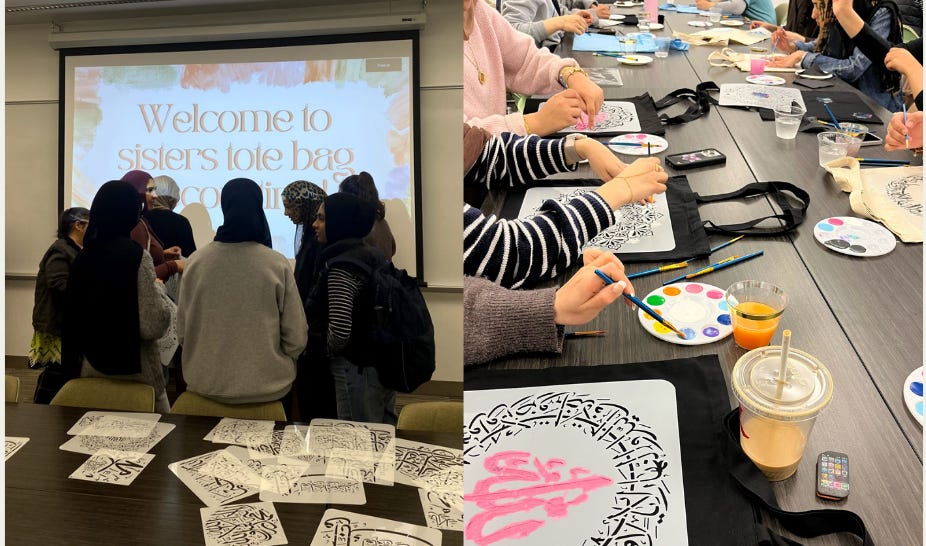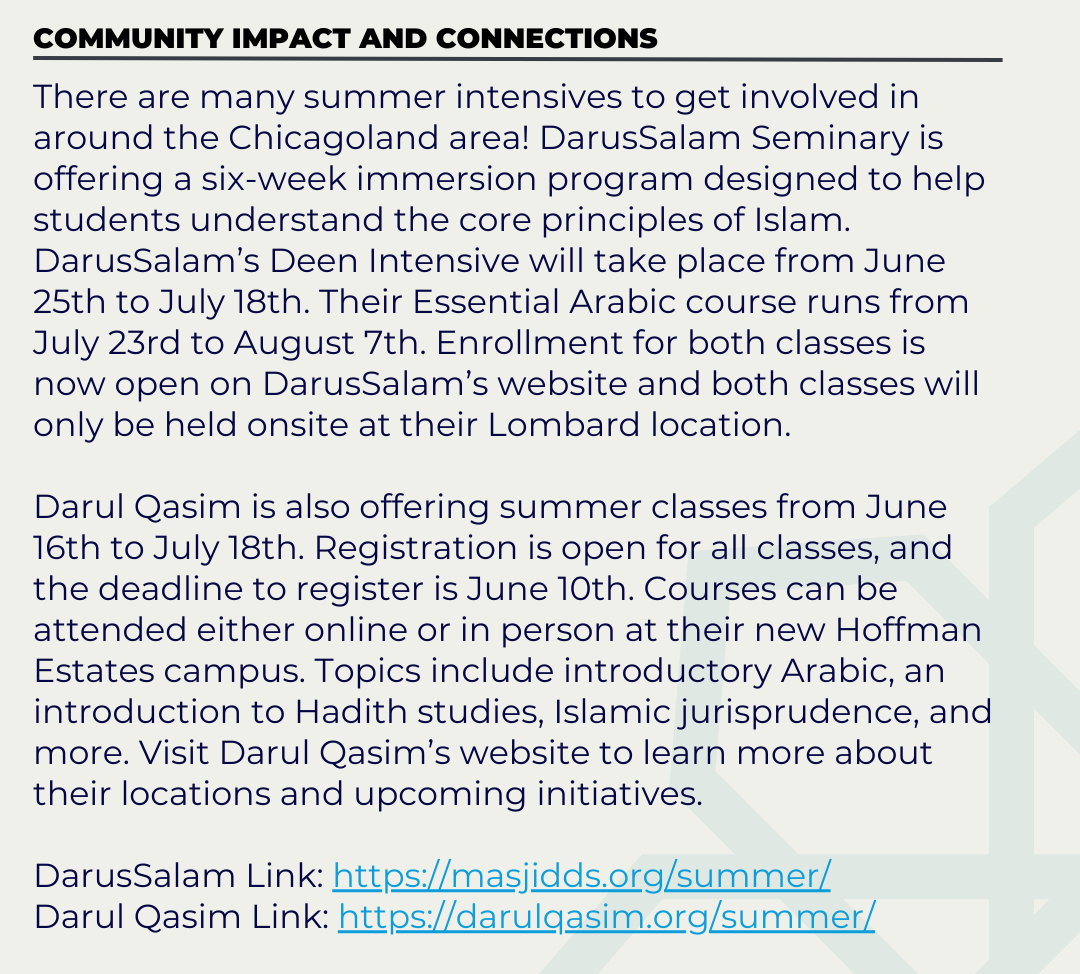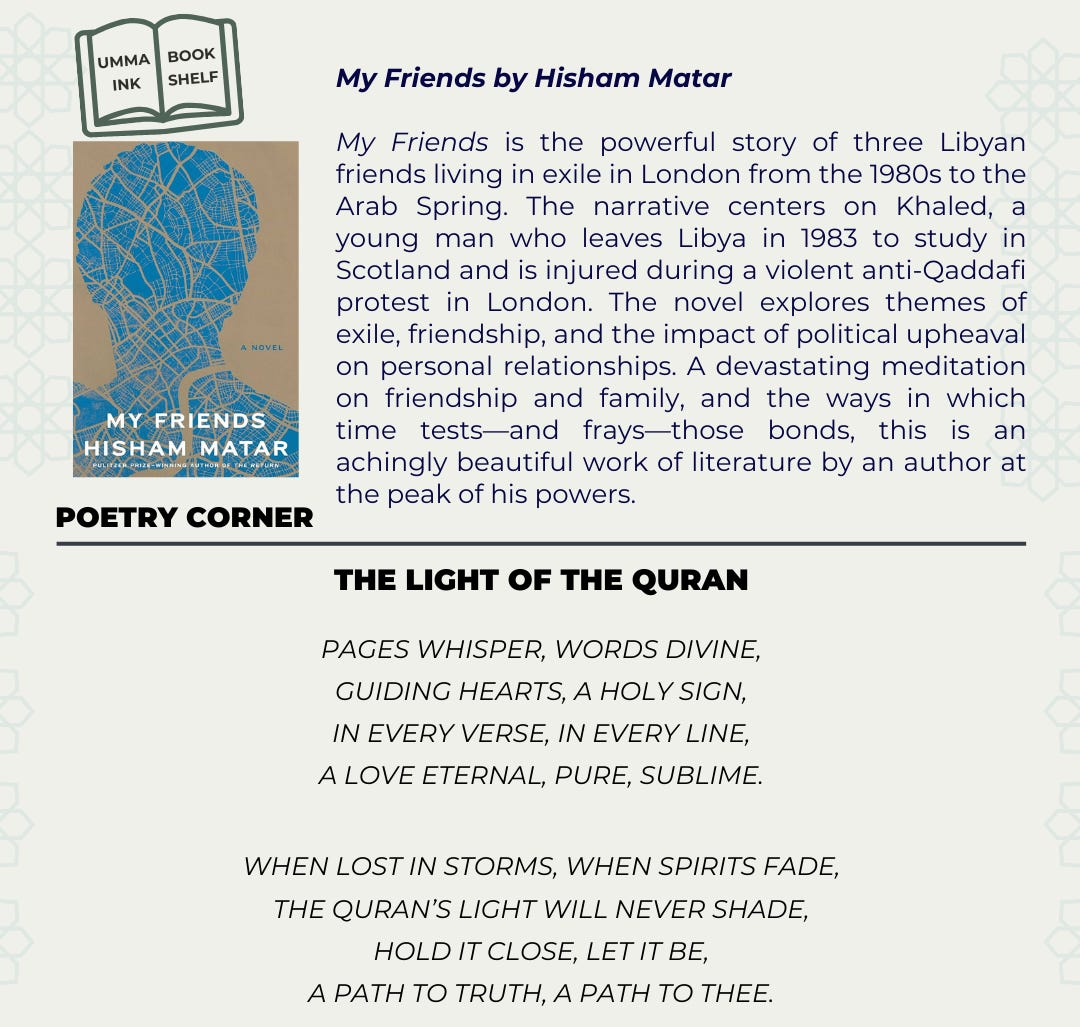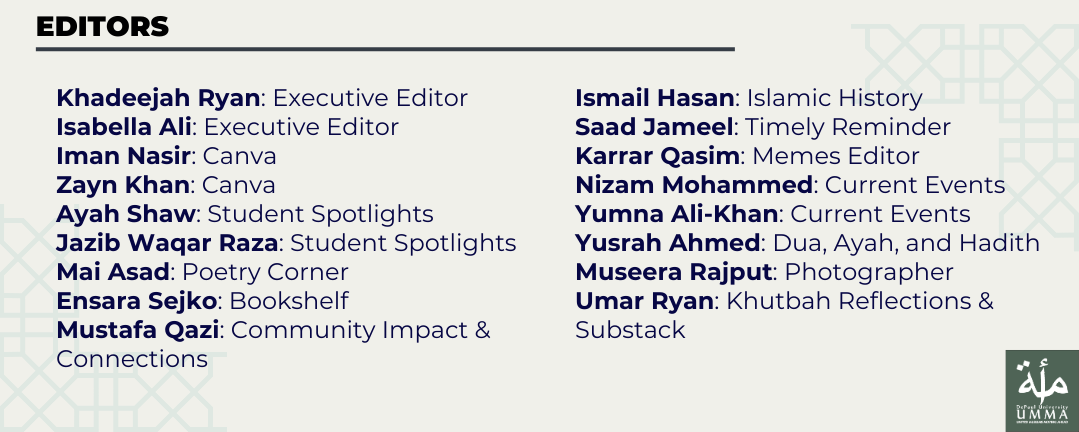Volume 6 Issue 9
Featuring some answers from our "Ask the Chaplain" form! Use the link to anonymously ask any questions you may have!
Salaam everyone! Inshallah your classes are going well and you are enjoying the warmer weather! As we approach the end of the year, we’re looking for new writers to join our UMMA Ink Team for next school year! If you're interested in being a part of this creative team, please fill out this interest form: https://forms.gle/Gkdhhfta9Vy1E7iT9
-The UMMA Ink Team
Ask the Chaplain
How can we go about making friends in college without participating in cliques?
Cliques, and our attitudes toward them, are an interesting topic. A clique refers to a group of people who form friendships, often centered around certain shared interests or identities. Talk to anyone who is involved with student groups and the presence of “Cliqueness” is a frequent topic of conversation. The negative connotation of the word is often centered around the idea that cliques are selective, and do not allow anyone to join. This element of exclusivity is sometimes coupled with a feeling of superiority or negative social behaviors such as backbiting towards others outside the clique or towards those inside as a means of policing the group and its behaviors. Growing up I loved the John Hughes movies (Breakfast Club, Some Kind of Wonderful, Sixteen Candles) which of course depict teen life as ruled by cliques. While most people would say their own experience wasn’t exactly like that, every young person can recognize the desire to be someone different or more popular or the pain of feeling rejected in that pursuit).
As Muslims I think it is important that we follow the guidance of our deen but also not be afraid to acknowledge realities of life and human behavior. It would perhaps be misguided and utopian to think the solution to cliques is just for everyone to be friends with everyone. One of my favorite stages to observe for my children is when they first start school and everyone in class is “my friend so and so…my other friend so and so..” Of course that quickly morphs to a stage where even young kids become aware that some people are friends and some are just classmates. Sadly for most young people I think not having enough (or in some cases, any) friends is a more real problem than not being able to accommodate all of your friends in your clique.
The reality is DePaul is a big place and you are not going to be friends with everyone -- of course that doesn’t mean that you can’t be friendly and kind to everyone. People should also always have a right to choose to spend time with people because they enjoy their company and not feel they must spend time with people with whom they don’t get along.
So what should we seek to avoid with regard to cliques? First, do not look down on people who are not part of your group. Arrogance along with ungratefulness are the character traits most condemned in the Qur’an and Sunnah. Second, do not engage in destructive behaviors like back-biting or slander towards anyone, within or outside of your social circle. Third, engage in behaviors like coming to prayer, spending time in the UMMA room, or attending events that cut across social circles and allow you to meet different people. If a particular social group seems to bind itself together in unhealthy ways, seek a better group of companions who are bonded together by shared values or healthy activities rather than poisonous behavior.
Over time if you follow these guidelines, you will, with Allah’s help, develop healthier relationships. I said before that you should not feel obligated to be friends with anyone, but you will likely find your idea of who is a good companion to change as you get closer to Allah. InshaAllah you will focus less on superficial ideas of who is popular or can do things for you and more on who brings out the best in you.
May Allah bless us with a beautiful community and meaningful and beneficial relationships with friends and companions!
I have very severe eczema on my hands and arms. Very painful, flaky, chapped, inflamed skin, sometimes I need to wear protective gloves to decrease inflammation. Performing my prayers is very important to me, but doing wudu regularly is very challenging because water increases my skin inflammation.
I can keep wudu from the morning for a couple of prayers but I'm unable to keep wudu all day. My doctors have recommended that I not wash more than I need to. I know there is the possibility of wudu with no water in times of drought, but to my understanding it’s supposed to be used sparingly. What do you suggest?
May Allah bless you for your enthusiasm for your prayers and your desire to purify yourself for them! May Allah heal you and reward you for any frustrations or pain that comes from any health condition or sickness! I wanted to share the answer to this excellent question because it reminds us of some very important principles of our deen and of the Shariah of Islam.
Allah provides for us in the Qur’an along with the instruction to purify ourselves for prayer, the instruction to do tayammum if we cannot access water or if using water would harm us due to illness. (See An-Nisa, Ayah 43). While the fact that we have to go down the hall to wudu or the water may be a bit cold in the morning are not reasons to avoid wudu, the fact that doctors have said it brings harm to us means that we should do tayammum (dry ablution).
In a famous incident during the time of the Prophet (saw) an injured Companion asked others if he could do tayammum instead of ghusl because water would harm his injury. Those with him told him he still had to do ghusl. He later died from his injuries. When the Prophet (saw) heard what happened he said, “They killed him, may Allah kill them! Could they not ask when they did not know? The cure for ignorance is inquiry.”
From this evidence we learn that the Shariah in its mercy contains many explicit concessions for people’s well being. The Shariah came as a guidance to us and a Mercy for us, not as a punishment. Based on this principle of bringing benefit and avoiding harm and taking circumstances into account, there are other concessions that can be extended as well by qualified scholars. We learn that the sign of sincerity is seeking knowledge and applying it, not acting zealously but ignorantly.
May Allah make us people who seek to follow the guidance of Allah and His Messenger and ask when we do not know.
Can we please get more water jugs for bathrooms around campus?
May Allah reward you for this desire to facilitate ease and cleanliness for Muslims on campus. Currently we do have water jugs (aka lotas) in the 3rd floor bathrooms of the Student Center where we also have the foot washing stalls. We are exploring the possibility of having some more. Some things to keep in mind are working with those who keep our facilities clean to make sure they understand the purpose of the jugs. We also have to think through how to make sure others who use the bathrooms do not misuse them. Above all, as some of you will know, I have at times had concerns with the mess our community creates in the bathrooms including a lot of spilt water. Again this is not the concern with everyone or at all times, but it has come up in the past, and I’m not sure if the water jugs help with this or make it worse. As many of you know when we were hoping for the expanded Muslim life space part of the vision included expanded facilities for wudu. We will continue to explore possibilities like this as I know part of the problem is just that we are putting more stress on the bathroom facility than it is designed to handle. In the meantime, however, we are exploring increasing availability of water jugs but doing it in a thoughtful way involves more than just purchasing the jugs. Expect to see some outreach in the near future for help in figuring out the best way to do this.
Khutbah Reflections
In last week's khutbah, Abu Noor touched on how we as college students and young people finding their way in this world can find and recognize teachers and mentors who will push us to learn and grow.
One story he referenced was the hadith of the boy and the king, mentioned along with the People of the Ditch in Surah al-Burooj. Just as the old sorcerer was seeking someone he could teach to carry on his evil deeds, there are people today who even despite their exhaustion or past works are committed to upholding evil, or to a lesser extent, chasing the dunya or material things. As Muslims, we have to be MORE committed, devoted and passionate than these people about pleasing Allah and doing good. Our love for Allah should be greater than our love for anything or anyone else, and it is this love which motivates us to do our best despite the odds or the short-term outcomes of our efforts. As Allah says in the Qur’an:
“How many (i.e., how often) a small company has overcome a large company by permission of Allāh. And Allāh is with the patient.” (2:249)
Although the boy was called to learn magic by the oppressive king and his sorcerer (an opportunity which contained many trials), it was by the will of Allah that he also met the monk, who drew him in with his kind speech and increased his faith in Allah. Through this example, we can reconcile with the fact that Allah will put us in various situations throughout our lives. We may at first expect to gain certain things from these experiences but later come to find that Allah had something different but better in store for us. The magician proved to be harsh and abusive toward the boy, but he felt comfortable enough to confide in the monk, who offered him hope and a solution to his problem.
May Allah grant us all teachers and mentors who we can trust; people who truly want what’s best for us and not just themselves, and who push us to be better by being tough yet merciful. Ameen!
Current Events in the Muslim World
Government Crackdown on Kashmir Ensues After Pahalgam Attack
On April 22, 26 people were killed, while over a dozen more were injured when a gunman opened fire on tourists. The attack took place in Baisaran Valley, located in Pahalgam, Kashmir; a popular tourist destination and town in the India-administered side of the region, referred to as “mini-Switzerland”. The attack is among one of the deadliest and most unexpected in the region in the past quarter-century, given that it was tourists who were targeted. The Resistance Front (TRF), a small resistance group believed by India to be a subsidiary of a larger militant group in Kashmir known as Lashkar-e-Taiba, claims responsibility for the attack. The motive for TRF’s shooting appears to have come in opposition to India removing Kashmir’s partial autonomy status and allowing non-locals to obtain land rights and government-sponsored jobs. While India has also accused Pakistan for the attack, suggesting their collaboration with these militant resistance groups, they have denied any allegations.
Following the attack, there has been a variety of responses from India, Pakistan, and the international community as geo-politcal tensions rise over Kashmir. Retaliatory measures from India include suspending the Indus Waters Treaty of 1960, SAARC Visa Exemption Scheme (SVES) visas for Pakistanis were canceled and those visiting in India were given 48 hours to leave, and participation of Indians in both countries’ High Commissions have decreased. As Pakistan puts in place similar measures, there are fears of greater conflict ensuing. Over 1,000 religious schools have been closed in Pakistan-administered Kashmir, while the 1.5 million people living near the Line of Control (LoC) have started to build bunkers if they can afford it. The attack has also been further used as reason for lengthy detentions without trial of activists and civilians and increased settler violence.
Regional Tensions Rise, Jordan Bans Muslim Brotherhood
On April 23, the Jordanian government banned the opposition group, Muslim Brotherhood. Declaring its illegality, Brotherhood offices were raided, records were confiscated, and promotion of their ideologies was prohibited. The abrupt, formal outlawing of the group happened after Jordan had accused the Muslim Brotherhood of planning to carry out attacks on the country and “sow chaos”. The Jordanian Muslim Brotherhood—a branch of the original Brotherhood formed in Egypt—has been in operation since 1945, one year prior to the establishment of the Hashemite Kingdom (Jordan). The Brotherhood began as a licensed charity organization, and as its scope grew, it added a political wing, the Islamic Action Front (IAF) in 1989. Both the brotherhood and IAF have opposed the politics of Jordan’s regime. Some believe that banning the Muslim Brotherhood is an act in a series leading to the revoking of the IAF’s license, thus removal as an opposing political party. There was allegedly coordinated pressure for Jordan to do this from other nations like Saudi Arabia, the United Arab Emirates, and Israel, as a result of increased condemnation of Israel’s actions in Gaza, and to try and maintain regional diplomacy.






